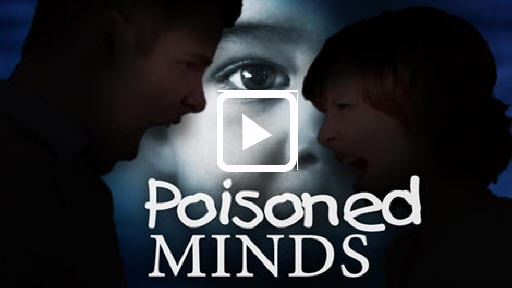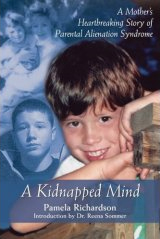Preventing Parentectomy Following Divorce
By Frank S. Williams M.D.
Keynote Address, Fifth Annual Conference
National Council for Children's Rights
Washington DC, October 20 1990
Frank S. Williams, M.D. Child and Adolescent Psychiatrist and Psychoanalyst for children, adolescents and adults, is Director of Family and Child Psychiatry at Cedars-Sinai Medical Centre in Los Angeles. Dr. Williams also directs the Cedars-Sinai Program for Children and Families of Divorce.
Introduction
Parentectomy is the removal, erasure, or severe diminution of a caring parent in a child's life, following separation or divorce.
Parentectomy covers a large range of parent removal from partial parentectomy, "You may visit your Daddy or Mommy every other Sunday"; to total parentectomy, as in Parental Alienation Syndrome, described by Gardner; or complete parent absence or removal. The victims of parentectomy are the children and the parents so severed from each other's lives. A parentectomy is the most cruel infringement upon children's rights to be carried out against human children by human adults. Parentectomies are psychologically lethal to children and parents.
In the worst consequential wake of a parentectomy , the victim parent gives up and walks away from the surgically-minded adults and the victim children. When this happens, the victim parent walks away from the chronic warring battlefield with intense ambivalence and confusion, faced with an insoluble dilemma. He or she knows that the chronic war in which one parent tries to erase the other parent, and the other parent struggles to stave off the parentectomy, is itself destructive to the children, as it causes ongoing tension and stress in them, as well as in the ongoing interaction between the children and each of their parents. On the other hand, if a mother or father gives up and walks away from the war, the children feel abandoned by a loved and needed parent, and unusually resent and become depressed over the abandonment.
Although children hate fighting and pray for it to stop, they misinterpret a parent's giving up the fight as that parent's not caring enough about them. Yet, clinicians know that, in these cases, even when a father or mother gives up the battle for custody, it is hardly ever due to not caring for their children enough. Rather, they give up the fight because they are emotionally depleted, physically exhausted, worn out, depressed or financially drained; they don't want to continue to subject their children to the relentless warring; they discover that they have little chance of success against a prejudiced legal/judicial system, and little chance of success against a prejudiced, incompetent or skillful "hired gun" - mental health professional, who has been paid to facilitate a parentectomy. Unfortunately, for the right price, such psychological surgeons can be found.
Further Consequences of a Parentectomy
In addition to the worst scenario of actually being abandoned, when a parentectomy occurs, children lose the rewarding ongoing opportunity to give and receive love to and from a parent who has loved them.
These children frequently become depressed - especially in later adolescence. At times their depression reaches suicidal proportions. In my own clinical work, as well as in school and emergency room consultation experience during the past 15 years, I have found a very high correlation between suicidality in adolescents and a divorce in their earlier years, which virtually results in one parent being erased from their lives.
They often lack self esteem, particularly if they believe the erased parent willfully abandoned them, or when the remaining parent behaves as if the erased parent never existed or never loved and cared for the children.
Children with parentectomies often go on to mistrust and fail in adult intimate relationships, this is for several reasons. first, they tend to see people as good or bad, right or wrong, loving or hateful, worthy of gratitude or worthy of punishment. Secondly, they have usually witnessed models of adult relationships based on mutual accusations and defensiveness, as opposed to the healthier model of tolerating ambivalence about the good and bad in others and in oneself. Further, in cases of Parental Alienation Syndrome, they may leave home prematurely or turn against the "favoured' parent later in life. Their turning against the one favoured parent may come about in later adolescence, when they realize they were "brainwashed" victims caused by a malicious, angry, or disturbed parent, to unjustifiably hate the other parent.
Methods Used in the Service of Parentectomy
A parent seeking to perform a parentectomy usually enlists the help of attorneys, relatives, friends, and mental health professionals, in the pursuit of the radical removal of the other parent.
They have several methods at their disposal. First they can get the potential parent victim - usually the Father - to see a "friendly," "brilliant" mental health clinician or child development specialist, who will brain-drill the potential parent victim about a distorted, out-of-context version of the psychological and developmental needs of children. The child development specialist will reiterate that children - especially young children - need the stability, constancy and consistency of one home, and that it is emotionally harmful for the children to be shuttled back and forth between homes. They will reiterate that children need a primary psychological caretaker.
From my own clinical experience with children, I would agree with the position that one home provides stability and continuity. However, when parents are divorced, the children cannot enjoy the benefit of both parents living with them in the same home. Therefore shuttling between homes may be inevitable. In divorce, we usually do not have the option of choosing what is in the best interest of the children. Instead, we most often must choose the least detrimental of several detrimental options. This is especially so when a child has been psychologically bonded to two parents. Of two potential evils for children - the evil of shuttling between the homes of two loving, caring parents versus the evil of losing one such parent - certainly the lesser evil is shuttling between two homes. It is the continued parental bonding, not the number of homes or vehicular travel, that will be the crucial determinant of children's forward psychological development following divorce. In these days, when both parents frequently work, and rely on sharing the child-rearing with each other, with other family members and with housekeepers and day care personnel, the concept of one "primary psychological caretaker" is outdated. frequently there are two psychological caretakers or a network of caretakers, supervised by two parents.
Should the "friendly," "brilliant" mental health clinician described above fail to convince the victim of the need for a parentectomy, the determined other parent can then enlist the aid of the "hired-gun" child development expert. After a brief, superficial contact with the other parent, of times without ever seeing the victim parent or without ever seeing the children interact with the victim parent - the "hired-gun" will unequivocally and with utmost scientific certainty declare:
- that the children mistrust and are afraid of the victim parent;
- that the victim parent lacks empathy for the children;
- that the victim parent emotionally abuses the children;
- that the victim parent is an alcoholic or other substance abuser;
- that the victim parent is impulsive and prone to potential child physical abuse; and,
- worst of all, that the victim parent suffers with a serious psychiatric disorder, such as Borderline Personality, Narcissistic, Anti-Social, or Obsessive Compulsive Personality disorder, or perhaps even Paranoia or Schizophrenia.
Allegations of Child Sexual Abuse
Should the "friendly" counselling and "hired gun" approaches fail, the parent determined to perform a parentectomy can make an allegation of Child Sexual Abuse. This is most effective when the child is of preschool age, and easily confused. Such allegations need careful expert professional attention. Proper thorough evaluations must be conducted, during which time the child should not be removed from either parent. In selective situations, following parental separation and divorce, mothers, father and children are highly vulnerable to sexual abuse activity. When a child or parent is quantitively deprived of loving parent-child contact, the child or parent may over-cherish or over-respond to physical contact, which may become eroticized. When there is no other adult to console a lonely parent who feels frightened at night and that lonely parent's child also feels lonely and frightened at night, the parent and child may wind up sleeping in the same bed together. this increases their vulnerability to erotic, sexual contacts.
Although we should not summarily dismiss the possibility of actual sexual molestation, at the same time we have found that most allegations of child sexual abuse during custody wars are false allegations. Some are calculated manipulations, while others result from parents' anxieties, misinterpretations, and their clouded perceptions during custody battles.
Absence of Cooperation
If all the above methods fail, the parent determined to perform a parentectomy can then claim, "We can't cooperate and therefore we cannot share parenting by way of any form of joint custody, as joint custody requires substantial parental cooperation." Unfortunately, this declaration is often supported by mental health clinicians, because of their misunderstanding or over-statement of the writings of Dr. Richard Gardner. Dr. Gardner's clinical experience with children and parents of divorce is often misused to reinforce this faulty point of view about parental cooperation.
When Richard Gardner stated that "joint custody" requires a high degree of parental cooperation (1986, 1989), he was using his particular definition of joint custody - one in which there is a free-flowing, flexible arrangement; one in which the children and the parents may frequently shift schedules, may often change the days and times the children are with each parent; and may alter parental responsibilities for the children's school and social activities. In such flexible arrangements, the shifts in schedule and responsibilities can occur during any given day, week or month. Of course, such an unstructured, ever-changing form of joint custody require frequent parental contact, negotiation and discussion, and often involves the children. Such a form of flexible, free-flowing joint custody would require parental cooperation, and would not work well where one parent hates or is emotionally allergic to the other parent.
This particular form of joint custody however, is now a rare and somewhat antiquated form of joint custody. It reflects the efforts of those few special early "pioneer" parents who respected each other as parents and individuals. They were therefore able to explore flexible joint arrangements in attempts to continue their children's lives with both parents. In essence they explored and maintained living environments, approximating the pre-divorce situation. In contrast to Dr. Gardner's definition, my definition of "joint custody" is a multi-faceted one. At one end of the spectrum, it includes such flexible unstructured, free flowing arrangements, defined by Gardner. At the other end of the spectrum it includes a detailed, rigid and highly structured parent-child plan, which minimizes the need for parent contact, negotiation and communication. Between the two extreme ends of the spectrum are varying arrangements in which real significant living time, including overnights, is shared with the children by both parents, with varying degrees of structure and rigidity, as required. Indeed, with warring, unfriendly, uncooperative parents, a highly structured, rigid, inflexible custody schedule is necessary and appropriate. The structure for high conflict parents should include transitions for the children between parents, on neutral grounds; for example, the children can be picked up from and be returned to school, instead of the other parent's residence. This arrangement avoids points of battle between the parents, and avoids the need for frequent negotiations on a day-to-day, or week-to-week basis, which, in turn, avoids the need to battle over decision-making, residential time, or parental authority in front of the children.
It is unfortunate that Dr. Gardner has been misunderstood and misused by some mental health clinicians advocating for sole custody to one parent. In consultation with Dr. Gardner, I learned that he believes that when there are two highly bonded loving parents, a rigid structured schedule of even 50-50 shared residential overnights, as well as a pre-defined structure decision-making authority plan for each parent may be appropriate to best serve the children. He would just not define such a 50-50, rigid, structured arrangement as "joint-custody".
Dynamics Behind the Pursuit of Parentectomy
Parental Identity
The fear of losing one's parental identity is the principal dynamic behind parentectomy efforts. Throughout life, all persons gain and integrate many identities, which become part of their self-images. These identities include one's identity as: a child member of a family; a student; a peer or team member; a professional or other worker; a mate with marital identity; a person with a parental identity; and a grandparent with a grand-parental identity.
Until recent times, some parents, more traditionally mothers in our western culture, reached a point of divorce with primarily marital and parental identities. For such parents, as their mate or marital identity dissolves, as it does in divorce, the only identity often left for them to hold on to, cherish, and fight for is their parental identity.
Grandparents, especially when they are retired from both work and parenting, often fear loss of their primary remaining identity - their grandparents identity. As they envision sharing or losing valued time with their grandchildren, their fears may prompt them to harp on their sons and daughters to fight for sole custody of the children, so they will not become "unemployed" grandparents.
The appearance of a potential stepmother or stepfather on the scene is highly threatening to parental identity. This is especially so when that newcomer has a great need to parent. Hearing one's children refer to a step parent as "mommy" or "daddy", often triggers the search for the parental scalpel.
The Loss of the Family
For adults, the pain of losing one's family structure is very intense, and in may cases, much more intense than the pain of losing one's mate. Divorcing parents often desperately hold on to a myth that their family has not fallen apart, in their attempt to not feel the pain and depression which accompanies the rupture of the family. They maintain the myth of a one-family structure, embodying elements of one home and one family. This myth is much easier to hold on to is a parent does not have to see the other parent. It is especially easier to hold on to if a replacement is brought in to fulfill the other parent's role, namely a boyfriend, stepfather, girlfriend, or stepmother.
In counselling parents of divorce, I have found it much more productive to focus on the pain caused by the loss of family structure, as opposed to focusing on the pain caused by the parent's prior battle with each other, or the pain caused by their loss of each other.
The literature on divorce leans heavily on the concept that divorced parents chronically battle in an effort to hold on to each other and not lose the marital relationship. Although that dynamic does exist, in my experience it is not a universal post-divorce dynamic, and it is not the primary reason behind prolonged custody struggles or prolonged custody wars. Instead, I find the need to hold on to this myth of one non-ruptured family is a mopre usual dynamic behind prolonged custody wars. Unfortunately, maintaining that myth of one family, requires erasing the other parent.
Envy, Rage and Revenge
A parent's desire to punish the other parent by depriving the other parent of his or her children often relates to the other parent's apparent or fantasied greater success or luck in life. This can create rage and envy. The real or fantasied greater success is in the area of: finding a new and rewarding love relationship; achieving greater financial security; having a wholesome extended support system of family and friends; and most ironic, envy and rage in relation to the other parent's fantasied or actual greater success in relating to their children in warm, comfortable, loving and trusting ways.
It is this rage, envy, and the wish to punish that we see most often in severe cases of Parental Alienation Syndrome, with very pathologically disturbed parents.
Psychological "Allergic" Reactions to the Other Parent
We frequently see situations in which one parent became psychologically dependent upon the other during the marriage.
Once separated and needing to break the dependency but fearful of the continued power of dependency, such a dependent parent feels and urgent compulsion to avoid the other parent as one avoids poison ivy. Feeling emotionally "allergic" the dependent parent fears susceptibility to renewed dependency. To avoid the allergen - namely the other parent - the dependent parent attempts to achieve complete avoidance which, of course, is easier to achieve if that parent can be kept out of the children's lives. The allergy medicine - parentectomy - becomes the children's poison!
Prevention of Parentectomy
The following recommendations on how to prevent parentectomies may, in part, appear drastic. These prevention measures which are presented in the spirit of suggestions, and based on clinical experience, include:
- Person contemplating marriage and children should consider a proposed mate's tendency toward relying on the role of being a parent as his or her exclusive identity. Such persons may need to rely totally on full-time control over the children for identity following divorce.
- One should try to fall in love with and have children with a mate who has great empathy for children's needs and feelings. A mother or father with empathy who loves his or her children will usually not subject the children to a parent removal.
- One should not separate from one's mate without a scheduled, structured, legal custody arrangement, in advance of parting the marital relationship.
- Once separated, a parent should never speak with and certainly should never see a mental health professional - other than a court appointed one - that he or she has not helped choose in advance, and should further avoid like the plague a friendly-sounding psychiatrist, psychologist, social worker, or counsellor, who calls and says he or she wants to help the parents and children through the pain of divorce. this is especially so when that professional has already seen the children and the other parent.
- Parents should seek and hopefully find attorneys not biased by the conviction that all children need a primary home and a primary caretaker after divorce.
- The first moment it becomes clear that scheduled custodial time with one's child is being consistently blocked, the parent so blocked should, run not walk, with his or her attorney, to the nearest family court.
Conclusion
Many parents, mental health clinicians, and attorneys have had contact with the process of parentectomy as a victim or as someone close to a victim. Professionals must guide victims or potential victims through the maze of legal, judicial, mental health and family processes which can lead to the radical "surgery" of parent-erasure I call parentectomy. Attempts at parentectomy create a psychological reign of terror, for the intended parent and child-victims. Those victims who survive are emotionally bloodied, bitter, war-torn, and exhausted. They often form and join support groups with committed and caring persons in organisations to protect their children and themselves, or to help others to protect their children and themselves from the dreaded sequelae of parentectomy. Most parentectomy victims and most of those who try to help such victims, experience a great deal of chronic emotional pain.
I wish there were a panacea to help reduce that pain. There is not. The author has shared his experience and thinking around children and parents of divorce, in the hope that increased understanding of the dynamics behind parentectomy, will help clinicians, attorneys, judges and parents eradicate this most dreaded, malevolent and destructive affliction of parents and children who love, care for and need each other.







